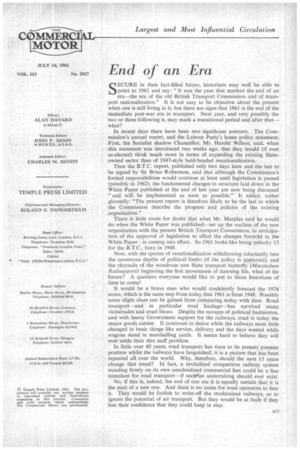End of an Era
Page 33

If you've noticed an error in this article please click here to report it so we can fix it.
SECURE in their fact-filled future, historians may well be able to point to 1961 and say: "It was the year that marked the end of an era—the era of the old British Transport Commission and of transport nationalization." It is not easy to be objective about the present when one is still living in it, but there are signs that 1961 is the end of the immediate post-war era in transport. Next year, and very possibly the two or three following it, may mark a transitional period and after that— what?
In recent days there have been two significant pointers. The Commission's annual report, and the Labour Party's home policy statement. First, the Socialist shadow Chancellor, Mr. Harold Wilson, said, when this statement was introduced two weeks ago, that they would (if ever re-elected) think much more in terms of expanding the existing Stateowned sector than of 1947-style bald-headed renationalization.
Then the B.T.C. report, published only two days later and the last to be signed by Sir Brian Robertson, said that although the Commission's formal responsibilities would continue at least until legislation is passed (possibly in 1962), the fundamental changes in structure laid down in the White Paper published at the end of last year are now being discussed. " and will be implemented as soon as possible." It added, rather gloomily: "The present report is therefore likely to be the last in which the Commission describe the progress and policies of the existing organization."
There is little room for doubt that what Mr. Marples said he would do when the White Paper was published—set up the nucleus of the new organization with the present British Transport Commission, in anticipation of the approval of legislation to effect the changes foretold in the White Paper --is coming into effect. So 1961 looks like being unlucky 13 for the B.T.C., born in 1948. , Now, with the spectre of renationalization withdrawing reluctantly into the cavernous depths of political limbo (if the policy is approved), and the chrysalis of the wondrous new State transport butterfly (Marpledum Radsupparti) beginning the first movements of dawning life, what of the future? A question everyone would like to put to those historians of time to come!
It would be a brave man who would confidently forecast the 1974 scene, which is the same step from today that 1961 is from 1948. Possibly some slight clues can be gained from Comparing today with then. Road transport—and in particular road haulage—has survived many vicissitudes and cruel blows. Despite the ravages of political badminton, and with heavy Government support for the railways, road is today the major goods carrier. It continues to thrive while the railways seem little changed in basic things like service, delivery and the days wasted while wagons stand in marshalling yards. It seems hard to believe they will ever settle their dire staff problem.
In little over 40 years, road transport has risen to its present premier position whilst the railways have languished; it is a picture that has been repeated all over the world. Why, therefore, should the next 13 years change that trend? In fact, a revitalized competitive railway system standing firmly on its own unsubsidized commercial feet could be a fine stimulant for road transport—if suchean undertaking should ever exist.
No, if this is, indeed, the end of one era it is equally certain that it is the start of a new one. And there is no cause for road operators to fear it. They would be foolish to write-off the modernized railways, or to ignore the potential of air transport. But they would be at fault if they lost their confidence that they could keep in step,
































































































































